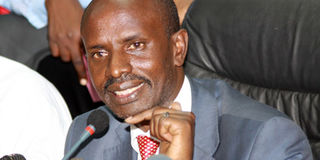Kenya facing a shortage of over 100,000 teachers

Knut Secretary General Wilson Sossion. Mr Sossion wrote to the Registrar of Trade Unions on August 1 opposing the registration of Kenya Pre-Primary Education Teachers Union. PHOTO | FILE
What you need to know:
- The shortage has greatly hampered learning in many schools.
- Mr Sossion wants the government to commit sufficient resources for hiring of enough teachers.
- He said subjecting headteachers to a five-year contract for will ruin school management in the country.
- Mr Sossion said headteachers needed promotion to other positions or retire but not be bound by contracts.
Kenya is currently facing a shortage of over 100,000 teachers in its public learning institutions.
This shortage of teachers is the greatest challenge in the provision and access to quality education in the country.
Kenya National Union of Teachers (Knut) Secretary General Wilson Sossion has asked the government to commit sufficient resources for hiring of enough teachers.
Speaking Tuesday on the side-lines of the Kenya Primary Schools Head Teachers’ Association (Kepsha) 10th annual conference being held in Mombasa, Mr Sossion said the shortage in primary and secondary schools was standing at 100,000 teachers.
“Enough and quality teachers are the only windows to quality education. The shortage of teachers in this country from ECD to tertiary institutions is close to 150, 000. If we don’t get it right at an early level we will never get it right at any level,” he said.
NO TO CONTRACTS
On the promotion of teachers, Mr Sossion said subjecting headteachers to a five-year contract for will ruin school management in the country.
Mr Sossion told Nation.co.ke that head teachers needed promotion to other positions or retire but not be bound by contracts.
“As a Union, we are telling the Ministry not to experiment the ideas and suggestions of the civil societies.
“This is going to ruin school managements and our schools will collapse. There is no day we shall allow the principals and headteachers to report to another authority.
“The employment act is very clear, that the employer appoints and assigns duties to an employee. Another third party would be irrelevant,” Mr Sossion said.
He said that in the same document there are proposals to introduce contractual teaching through county governments which he said contradicted the powers and privileges of the Teachers Service Commission (TSC).
We want the civil societies to vacate the Ministry of Education and we have asked Cabinet Secretary Jacob Kaimenyi and his team to withdraw the document and redraft it afresh.
Mr Sossion also called on the chair of the National Education Board not to allocate himself powers of CS Kaimenyi.
“The CS should not cede his authority to juniors. This will be the beginning of anarchy and we will not accept it,” he maintained.
EDUCATION FINANCING
Mr Sossion also raised issues with the financing of both free primary and secondary school education in the country saying it had been politicised
“It is a great concern that the financing of education has been heavily politicised. Since the inception of FPE there has been no review of the current capitation. Yes, it was done the other day but it is still not sufficient,” Mr Sossion said.
He noted that the Douglas Odhiambo Commission which was a presidential commission recommended the upgrading of the capitation by 300 per cent.
Mr Sossion said a 35 per cent upgrading was still very meagre. Coupled with the continued delay in disbursement of the funds, it had caused havoc in managing of schools, he said.
“We would like in future that money is wired to school accounts at the beginning of every school term. Learners should find money in school and this will help them access resources for use at the right time,” he said.





